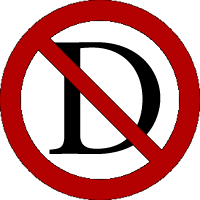 [Updated version.] A Mr. Hu (胡) in Dengfeng, China, wants to give his son the name “胡D”. In case anyone’s not clear on this, yes, that’s a letter from the alphabet, not a Chinese character that happens to look like the letter D. (The name would have been the same had the baby been a girl, he said.) But this is being blocked.
[Updated version.] A Mr. Hu (胡) in Dengfeng, China, wants to give his son the name “胡D”. In case anyone’s not clear on this, yes, that’s a letter from the alphabet, not a Chinese character that happens to look like the letter D. (The name would have been the same had the baby been a girl, he said.) But this is being blocked.
The hospital where the baby was born refused to issue a birth certificate under that name. The doctor in charge of the hospital was quoted as saying that he had consulted the local public security authorities responsible for newborn registrations. “We think it is better to name newborns with simplied Chinese characters instead of rare and strange characters,” he explained.
So for the time being, the baby’s parents have had to assign a name written with a Chinese character: 镝. By most practical measures, though, 镝 would fall under the heading of rare characters. The majority of literate Chinese would not recognize this character. Indeed, the majority of college-educated Chinese would not recognize the character, which is used to indicate the element dysprosium. On the other hand, almost everyone would recognize the letter D.
Thus, this isn’t a case of a name being rejected because it’s “rare and strange,” because in China the letter D is not rare but common and the character 镝 is certainly quite rare. (Whether 镝 is also strange I’ll leave to others.) And in China perhaps not even one in ten thousand would know how to write that character by hand.
In Mandarin, 镝 is pronounced essentially the same as the English letter D. Half the letters of the English alphabet have names that sound at least fairly close to Mandarin syllables, and thus they could be represented by Chinese characters. These are A, B, D, E, G, I, K, O, P, R, T, U, and Y. This, however, is seldom seen.
I wonder what would have happened if he had chosen a letter that doesn’t correspond to a Mandarin syllable. In support of his desired name for his son, Mr. Hu cited the example of Lu Xun’s “The True Story of Ah Q,” one of the most famous short stories in Chinese literature. Even in the Mandarin original, the character is referred to with the letter Q, as “阿Q.” (Lu Xun, by the way, was a strong supporter of romanization for Mandarin, as shown in essays such as “An Outsider’s Chats about Written Language.”)
The reverse situation — of using English letters to represent Mandarin morphemes — is fairly common among young Internet users.
The Hu family, however, has not given up. “When I find out laws and regulations to support the original name, I will apply to have it revised,” Mr. Hu said.
source: Child named with English letter, causing controversy, Xinhua, November 5, 2005.
earlier story (in Mandarin): “胡D” míngzi nán jiànlì, zhǐhǎo jiào “胡镝” [Hú Dī], Hénán bàoyè wǎng, October 26, 2005.
See also this earlier Pinyin News story: 911 Restaurant?!.

I’ve substantially revised the original version of this entry.
Pingback: Pinyin news » Zhejiang orders Pinyin, numerals removed from business names